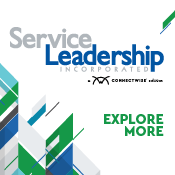What does it mean to be a trusted advisor?
When constructing your business or growth plan for your managed service provider (MSP) organization, what is the key to maximizing referral business and counting on existing clients to “sing your praises” when referring you to potential new clients?
You have to unpack a term that gets overused—trusted advisor. While it seems everyone today claims to be one or wants to become one, the reality is it’s a tough bar to reach.
Here’s the secret: clients won’t care much about the advisor part if the trust is not there.
What does it mean to be a trusted advisor?
Think about the vendors you’ve done business with over your professional career. Were there any that you turned to for advice on occasion? Have any of your vendors been a consultant for you on important projects? Did you view any of your vendors as experts or guides who could support your business endeavors? I’m sure they all wanted to advise you, and they were all asking you to trust them. I’m also guessing you can think of some that had great advice, but you chose to work with someone you had more trust with.
You want relationships with people that you trust to be a part of (or an extension to) your team.
They not only can provide sound advice on the industry, technology solutions, and the challenges their products or services address, but they also do some fundamental things well.
A true person or relationship acting in the role of “Trusted Advisor:”
- Is trustworthy in that the things they say can be counted on.
- They practice transparency and authenticity.
- Is client-centric in all thinking and communication.
If you want to position yourself as a trusted advisor for your clients and get a seat at their table, so to speak, start honing in on those three qualities.
Being trustworthy
First and foremost, deliver on your word. Simply put, do the things you say you’ll do.
As an MSP, when you first go into business with your client, both parties are likely signing off on a service level agreement (SLA). At a minimum, you are talking about expectations for the relationship. The key here is setting accurate expectations, either formally through a contract or informally through dialogue.
To be seen as trustworthy, you must stick to those expectations when you deliver. If you are off, the trust is broken. If your service delivery doesn’t match the expectations you’ve set, a frustration sets in that makes it hard to rebound from, and an opportunity opens up for a competitor to leverage that breach in trust.
A great example is security. The onset of a client relationship is when you need to outline what cybersecurity measures your MSP will take responsibility for and what the client will be responsible for. Setting proper expectations helps maximize trust. If you don’t set them, they will assume the risk is on you. And when things go wrong because of their behavior or lack of understanding, they will look to hold you accountable and responsible. Having that expectation-setting conversation upfront and then holding up your end of the bargain is how you gain and keep your clients’ trust.
Finally, if you’re selling yourself as an expert in a certain vertical, make sure you have the business acumen and experience to back up those claims. No one wants to feel misled, so be honest and don’t oversell your technology services.
Practice transparency and authenticity
Transparency and authenticity are crucial in successful long-term relationships. Tell the truth, even when it can be difficult for the client to hear, and even when it may put you in a not so positive light.
Telling the client they are secure is wrong. Security is a mindset and an exercise in risk mitigation. There will always be a behavioral component on the clients’ side that factors into security. You have no control over that. There will always be new bad actors and ways to make data more at risk. The minute you set something up, the clock is ticking, and the security it provides begins to be eroded through no fault of yours or your clients—it’s the nature of a connected world with bad actors.
Explaining that (in a non-frightening way) is the transparency and authenticity that allows you to enter into an advisor role that more accurately forms the dynamic of your relationship with your clients. A dynamic that has you in the role of advising your clients to make good decisions around the security, availability, and recoverability of their data and balancing that with how much they want to spend.
On the services side, did you detect a breach in your client’s network? Don’t sweep it under the rug—talk to your client about it. You have to set them up with a clear understanding that it can and most likely will happen. Your role is to implement current best practices to prevent and then have a response plan for if and when it does happen.
Did an external incident cause you to miss your SLA this week? Be honest with your client about what happened.
Are you changing your infrastructure or the way your team is organized? Give your clients a heads up.
Consistently and regularly talking about what’s going on behind the scenes helps your clients feel like they truly know you and that you’ve got nothing to hide.
Based on what you’ve outlined in your SLA, you can get a general idea of the key performance indicators (KPIs) and metrics your clients will want to be kept in the loop on. Whether your numbers are good, bad, or ugly, sharing them with your clients on a regular basis will prove that you are open and honest about your work and are willing to work with your clients to get the most out of your relationship and maximize what services you are able to cover for them.
This type of transparency truly says, “I’m your partner. I’m an open book. I’m here to help you succeed.”
Be client-centric in thinking and communication
Have you ever remained loyal to a brand solely because of how good their customer service is? Or, on the flip side, stopped doing business with a company because you were so unsatisfied with their customer support?
Customer service can truly make or break a business, so it’s something that deserves a lot of thought and attention. Done right, managed services is always a scalable proposition that inherently leads to clients beginning to think you look at them as “just another client.” You need to balance the scalability of your delivery with the accessibility and chance to dialogue that shows an interest and gives them the feeling that they are the most important client you have.
If your clients can easily reach you when they need you, they’ll be more inclined to see you as credible and reliable. In conversation with others, your clients might say that they love how supportive you are and that they’ll happily recommend your services.
Poor customer service is really hard to recover from and is likely to leave a long-lasting negative impression on a client, so it’s important to avoid a negative interaction as much as humanly possible.
Conclusion
This isn’t the first time you’ve heard this, and it can be easier said than done, but putting in the work to be a reliable source of truth and guidance for your clients can result in a fruitful and profitable business.
Happy clients are more willing and able to give you their hard-earned dollars, especially if you are helping them move the needle and grow their own businesses. And the happiest client is the one who feels like they have a partner by their side who celebrates successes, learns from failures, and constantly iterates processes to make sure both the client and the MSP are maximizing their potential.
Focus first on building and maintaining trust, and the advisor part will come.









